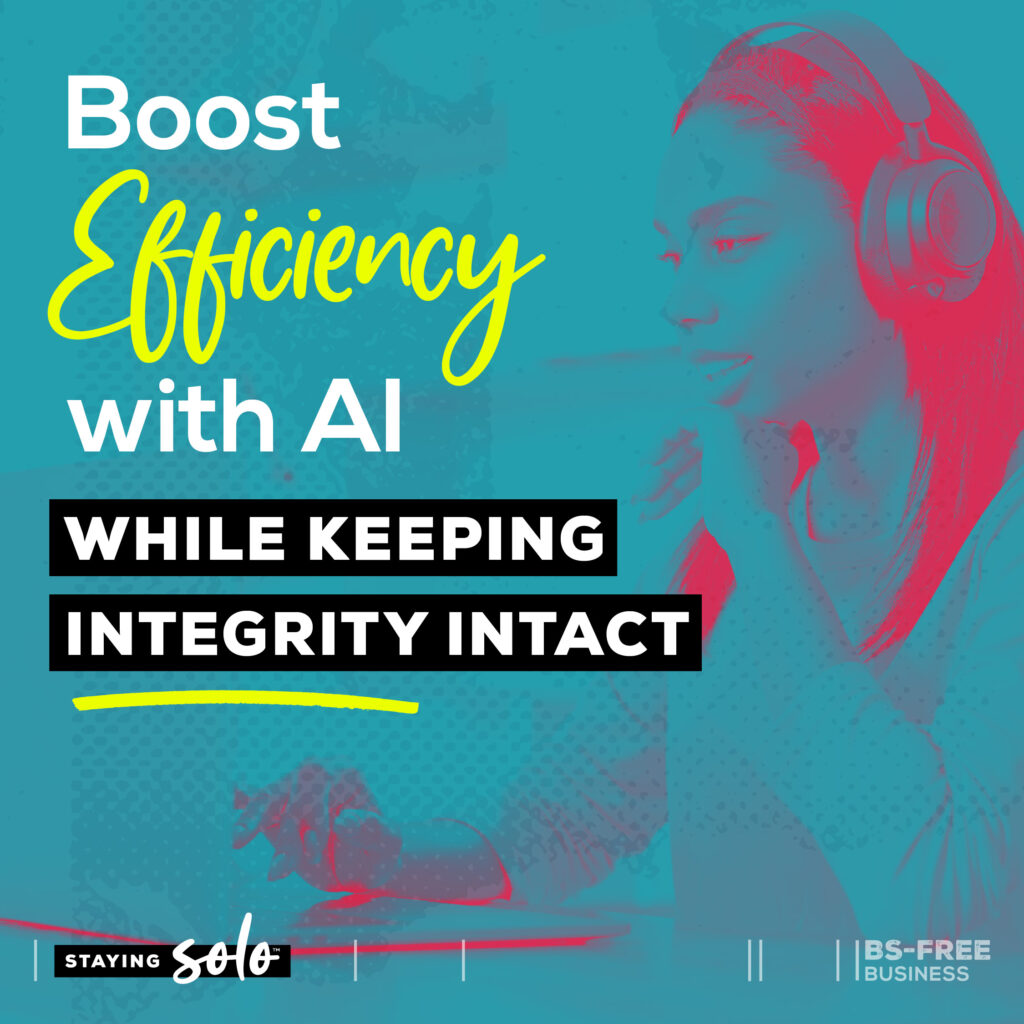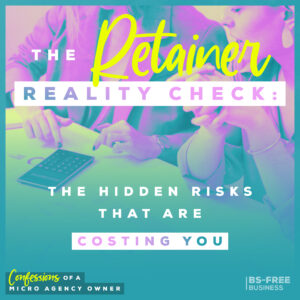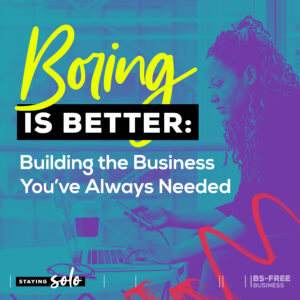
Search the site:
Boost Efficiency with AI While Keeping Your Integrity Intact
AI is the buzzword of the year—maybe the decade—and it’s showing up everywhere. Chatbots that answer your clients’ questions at 3 a.m., tools promising to handle your entire workload (spoiler: they can’t), and plenty of polarizing opinions about what it all means.
Today, I’m breaking it all down for you—the good, the bad, and the seriously thought-provoking. Whether you’re an AI enthusiast, a skeptic, or someone who just doesn’t want to fall down another rabbit hole, we’re diving into everything from its environmental impact to its creative possibilities.
How does AI fit into your business? Should it? And what about all those legal and ethical concerns lurking in the background? Let’s get into it: no fluff, no hype—just practical insights for you as a solo service business owner.
Today, we’re diving into a topic on everyone’s mind lately: AI.
It’s everywhere and utterly inescapable, from chatbots that answer questions at all hours to tools that practically promise to do our jobs for us.
But let’s be honest: while AI opens up some exciting possibilities, it also comes with many question marks and some pretty strong feelings.
Whether you’re excited, skeptical, or nervous about AI, this episode is here to unpack all those thoughts and dive into what to consider and how you can choose (or not) to use AI with integrity.
I’m going to cover a lot of ground, including environmental, privacy, and legal concerns, as well as deciding how to use AI and much more. Let’s do this.
The Environmental Impact of AI
Amid the hype and excitement about how AI can help us on a daily basis, a key consideration is this technology’s environmental impact.
A September 2024 report from the UN Environment Program highlighted the problems created by the AI explosion. AI deployments are housed in data centers, which consume water and energy and create electronic waste.
To put this in perspective, water is required to cool electronics in data centers, and it’s projected that “globally, AI-related infrastructure may soon consume six times more water than Denmark, a company of six million.” Plus, there’s the power needed to make AI happen, which often relies on fossil fuels and creates greenhouse gases.
An International Energy Agency report shared that ChatGPT “consumes 10x the electricity of a Google Search.” And the report Sustainability Starts with the Data Center from MIT Technology Review shares that “data centers use approximately 1.5% of total global electricity, a figure that is much higher in countries with large data storage sectors like Ireland where this figure jumps to 18%.”
Concerns about the impact of AI on the environment have spawned a push to “green” AI technologies and an emerging conversation around the link between the rise of AI and how it’s inextricably linked to climate environmental justice.
AI is undeniably a complex issue that requires big-picture solutions, but it’s also personal. Deciding when and how you’ll incorporate AI—whether for your business or daily life—is worth considering.
Legal and Privacy Concerns
Next, we need to discuss the legal and privacy considerations of using AI. This will be a relatively quick overview as this is a layered and nuanced topic, and I’m not an expert on all the ins and outs.
From a privacy point of view, most people’s biggest concerns are about how AI systems use their data to improve their algorithms. You need to know what data any tool is collecting, how it’s used, and how it’s being shared with third parties. You also want to know how that data is stored and protected.
As you consider this, remember that many of the tools you’re using right now have AI built-in, and you may need to actively opt out of data collection and processing. For example, with ChatGPT, you can turn off the sharing of your data so it’s not being used to train the large language model, or you can create custom GPTs so that data is not included and accessible to everyone.
This is where things can get sticky, depending on what data you input into AI tools. Are your clients okay with their data being used in this way? What data is private, and what can be shared? How do you disclose this to them and get their consent?
I’m not a lawyer, but I highly recommend you make some decisions about how you’re using AI and then ensure your client contracts disclose how you are (or aren’t) using it, so there’s no ambiguity.
While you may not be legally required to disclose this to clients as privacy laws aren’t keeping pace with the rapid development of AI, from my point of view, it’s about transparency and doing what’s right. We don’t yet know how regulations will evolve, but it’s always better to err on the side honesty.
From a legal point of view, using AI impacts copyright, ownership and intellectual property. If you do any creative work or any type of work that’s a key aspect of what you do, you must proceed with caution.
Currently, in the US, works created with AI cannot be copyrighted as they’re not considered to be created by a human. The 2022 case involving a graphic novel titled Zarya of the Dawn resulted in a series of policy changes, including the fact that “if a human simply types in a prompt and a machine generates complex written, visual or musical works in response, the ‘traditional elements of authorship’ have been executed by AI, a non-human. Therefore, it is not protected by copyright.”
Since then, there’s been a flurry of legal activity, and a number of high-profile lawsuits are in progress as media and entertainment companies react to their content or works being used to train generative AI models.
On the other hand, the UK offers copyright protection for works generated by a computer, and the EU has an AI Act in effect to deal with generative AI. Regardless of the current policies where you’re based, using AI to create original works that are part of your (or your client’s) intellectual property should give you pause.
Finally, remember that AI output shouldn’t be taken as fact or even assumed to be correct. In a statement about issues with its AI tool Gemini, Google said, “As we’ve said from the beginning, hallucinations are a known challenge with all LLMs — there are instances where the AI just gets things wrong. This is something that we’re constantly working on improving.”
These hallucinations are a distinct limitation of AI because it relies on the existing data set, so all factual information should be verified. When we first started using AI to help generate ideas for client content, we experienced multiple instances where ChatGPT made up reports or statistics that seemed credible but simply didn’t exist.
As business owners, we need to take responsibility for verifying the accuracy of any information resulting from an AI tool.
AI: Creative Catalyst or Distraction?
In full transparency, I’ve been using AI in my business for nearly two years, and I’ve had an ongoing internal struggle with when/where to use it. I worry sometimes that the upside isn’t worth it and that it’s making me dumber.
I know I’m not alone in this, and as someone who does creative work, I’m probably extra sensitive to it. The reality is that AI cannot be creative on its own and still relies on us for that creative spark.
A 2023 article from the World Economic Forum discussed how AI can be a double-edged sword: It can help catalyze our creativity….and be a massive distraction.
“In the past, we divided our time mainly between two activities: time with others and time for ourselves. Today, we spend more time alone, and there is also a third state: time spent with digital technology. It is likely that through AI, this third state’s share is increasing.”
“Unfortunately, the more AI successfully distracts us, it prevents us from more creative activities.”
Deciding How AI Fits into Your Business Ethically and Practically
With all that background, you’ve got a lot of food for thought when deciding when, why and how to use AI in your business.
For each of us, it will be a personal decision based on our level of concern about environmental, legal, privacy and creative concerns. (And honestly, there’s so much more I could add to that list like bias in generative AI and how there’s the potential to widen inequities.)
An excellent way to think about this is like any other tool or tactic you could use in your business. For example, sleazy sales tactics work for many people, but that doesn’t mean they align with your ethics and values.
You can decide how to use AI, so you’re in integrity.
Remember that even if you’re not using AI tools specifically, many tools you already use (such as Grammarly and Canva) include AI, so it’s already changing how we work.
As business owners, we need to accept that the market is shifting and find ways to work in a world driven by AI. The goal is to enhance your work, not replace your creativity, skills or talents.
McKinsey’s article What Every CEO Should Know About Generative AI provides practical applications beyond chatbots. “While text-generating chatbots such as ChatGPT have been receiving outsize attention, generative AI can enable capabilities across a broad range of content, including images, video, audio, and computer code. And it can perform several functions in organizations, including classifying, editing, summarizing, answering questions, and drafting new content.”
When you think about your use of AI, consider questions like:
- Where can it make your work better?
- Where can it broaden your perspective?
- Where can it save you significant amounts of time?
For you as a solo service business owner, AI has the potential to improve the depth and quality of your client deliverables while reducing the burden of administrative or even marketing work.
The possibilities are endless, but I’m not going to lie; depending on the tool, there’s a bit of a learning curve, and honestly, you can quickly find yourself in a rabbit hole.
AI in Action: Solutions for Solo Service Entrepreneurs
To help you consider the possibilities, I wanted to give you a rundown on where I see some real opportunities for solo service business owners to use AI:
- Dealing with administrative tasks: From scheduling to email responses, AI can help you cut the amount of time you spend daily or weekly. Look at how you can use AI to identify action items, prioritize tasks, manage documents, automate reminders, and more. At a basic level look at Google’s built-in tools like Gmail’s Smart Reply or Docs “Help Me Write”.
- Creating content: Think of AI as an assistant and thought partner when creating content. You can use it to create outlines, summarize transcripts, pull content for social media, identify what you may be missing, and so on.
- Competitive or content analysis: You know those client projects where you have so much data to review and analyze? Let AI do the heavy lifting for you so you can focus on the strategic recommendations.
- Time tracking and analysis: Time tracking has come a long way, and there are AI-driven tools like Timely and Clockify you can use to track your time and analyze it so you can analyze your work habits and patterns or trends. (I love this one as so many of you don’t want to do this, but it’s essential!)
- Editing and quality control: AI makes editing so much faster by catching grammar slips, checking your tone, and keeping things consistent. Tools like Grammarly and Descript help you polish your work so it’s sharp, clear, and ready to go.
This is just the tip of the iceberg, and I’m sure many of you use AI in ways far beyond what’s listed here. I can’t even tell you how much AI has helped me with figuring out calculations, and I absolutely will be writing a GPT for creating spreadsheet formulas.
The potential of AI to transform your work is enormous, but it’s crucial to thoughtfully consider how and when to use it, weighing both the risks and rewards while keeping the broader context of this technology in mind.
This is a topic I’ll be discussing more in coming episodes, so if you have questions, thoughts, or specific challenges you’d like me to address, feel free to reach out. I’d love to hear what’s on your mind and ensure future episodes are as helpful as possible.

I’m Maggie Patterson (she/her), and services businesses are my business.
I have 20+ years of experience with client services, am a consultant for agency owners, creatives, and consultants, and vocal advocate for humane business practices rooted in empathy, respect, and trust.
Read or Listen to the Latest
Check Out These Posts
For Solo Business Owners

Growing a solo service business is tough.
It’s even harder when you’re bombarded with BS advice that steers you away from your values and why you started your business in the first place.
This is the podcast for solo creatives and consultants who want to remain as a team of one and have zero interest in the hustle and grind of typical business teachings.
Subscribe now and never miss an episode.
For Micro Agency Owners
Most podcasts for agency owners obsess over revenue growth as the ultimate success metric.

But here’s the truth: not everyone wants to make millions. Your goal might be to build a sustainable business that lets you have a life and doesn’t run you into the ground.
Join me as I spill my shameless confessions and share everything I’ve learned about building a micro agency that skips the BS of tired and typical agency teachings.
Follow Now on All Major Podcast Platforms








